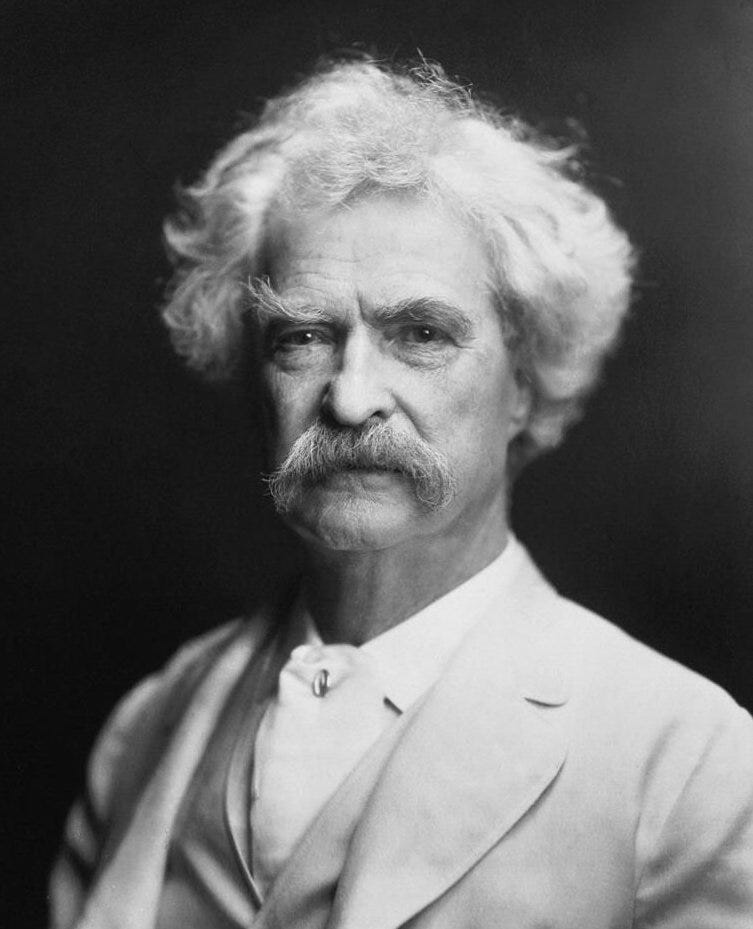Mark Twain's Tumultuous Life and Funny Work
Also: How to hop trains, Disneyland’s lost lands, Mr. Beast’s new book, and more.

Good morning! My son is getting married this Saturday, so there will be no Saturday email this week. See you on Monday!
Mark Bauerlein reviews Ron Chernow’s 1,200-page Mark Twain biography in the latest issue of First Things. He gives it mixed marks. Here’s a snippet:
In Mark Twain we watch a man ever on the move, with confrontations and small scandals erupting, friendships and partnerships flipping into betrayal and deceit, plans hatched and foiled, and writing never ceasing. Chernow recounts one compelling episode after another, some ludicrous and some sad, citing letters and news accounts, remembrances by friends and enemies, Twain’s notebooks and papers (mostly collected in the Bancroft Library at Berkeley), documents in the Mark Twain House & Museum in Hartford and dozens of other archives and libraries, plus guidance from curators of those sites, including the head of the Mark Twain Cave Complex, where visitors may go underground and imagine Tom Sawyer on one of his zany adventures.
Notables pass in and out, among them Ulysses S. Grant, encountered by Twain at a reception in Washington, D.C., while Grant was still commander of the army under President Johnson, and whom Twain describes as “poor, modest, bored, unhappy Grant . . . a particularly plain-looking man.” Years later, Grant’s Memoirs would become a fabulous success for the publishing house Twain directed; the men would meet and converse as the manuscript moved toward publication in Grant’s final weeks of life, laughing over having nearly faced one another during Twain’s short service in the Missouri militia. When he hears that the officer was just a couple miles away at that time, Twain boasts: “I supposed it was just some ordinary Colonel of no particular consequence, & so I let him go.” Grant the hardened soldier is amused by this Falstaff, and Chernow guesses that the humorist’s talk gives the former president some therapeutic relief. Twain himself comments in his notebook: “It is curious and dreadful to sit up this way & talk cheerful nonsense to Gen. Grant & he under sentence of death with that cancer.”
From Virginia City, where he worked as a journalist scribbling sensational stories of killings and satirical reports of political chicanery—a future senator would call him “the most lovable scamp and nuisance who ever blighted Nevada”—Twain went to San Francisco, then to the Sandwich Islands (Hawaii), before returning to the East Coast on a ship on which cholera broke out and caused several deaths, before voyaging to the Holy Land with a pack of Christians on pilgrimage, all the while recording his experience of people and places for newspapers at increasing rates of pay. The upright captain of the Quaker City, which carried the passengers across the Atlantic, worded his first observations of the man this way: “a tall, lanky, unkempt, unwashed individual, who seemed to be full of whiskey or something like it, and who filled my office with the fumes of bad liquor.” Twain replied in print that this proud figure of abstinence “is a mighty good judge of whiskey at second hand.”
Despite the book’s tiresomely repetitive condemnations of Twain’s harsh judgments on the foreigners and non-whites whom he encounters (Twain is “full of racial denigration, puffed up with American pride”), Chernow neatly conveys the uneven mix of “blasphemous laughs” and genuine solemnity on these early trips. Twain notes wryly that John the Baptist in a painting in Madrid looks a lot like a Spaniard, while in Dublin he’s all Irish. In Genoa, a guide says that St. John’s ashes sit in the Cathedral of San Lorenzo, and Twain remarks that he and the other tourists had seen John’s ashes already in another church. And yet, in Jerusalem he buys his pious mother a King James Bible, steals a few bits from Solomon’s Temple, and climbs the stairs to the Church of the Holy Sepulchre “with a far more absorbing interest than I had ever felt in any earthly thing before.”
Why has Twain endured? “The life Chernow tells is a series of private and public misjudgments,” Bauerlein writes, but the short answer to that question is: He was funny. Here’s Bauerlein:
Hearst Syndicate offered him “a whopping fee” to cover Queen Victoria’s Diamond Jubilee, an impresario in 1897 promised him $50,000 for an American lecture tour, and a silly story about a “jumping frog” published in the Saturday Review “set all New York in a roar,” according to one observer. Audiences across the world had never seen a stage persona like his . . . If you can make people laugh even as they sense serious undertones in the wit, they’ll forgive a lot. Twain did that again and again.
Danny Heitman reviews the biography in The Christian Science Monitor:
Chernow’s writing remains uniformly crisp, but his comprehensiveness accounts for the book’s length. At some 1,200 pages, this probably isn’t a title to tote to the beach. Readers hoping for a shorter read might want to check out Mark Twain: A Life by Ron Powers or Richard B. Lyttle’s Mark Twain: The Man and His Adventures.
On the other hand, Chernow’s outsize Mark Twain is an apt reflection of his outsize subject. Twain was larger than life, and he wanted fans to know it. Chernow includes a funny story about Twain’s days in New York, when he would time his Sunday walks “so as to pass churches as congregants spilled onto the sidewalk, and he would be mobbed by admirers.”
Andrew DeMillo reviews the book for AP, and Graeme Wood reviews it for The Atlantic.
Many of you have likely seen this before, but if you haven’t, watch Thomas Edison’s 1909 film of Twain, which was digitally remastered a few years ago.
Keep reading with a 7-day free trial
Subscribe to Prufrock to keep reading this post and get 7 days of free access to the full post archives.



